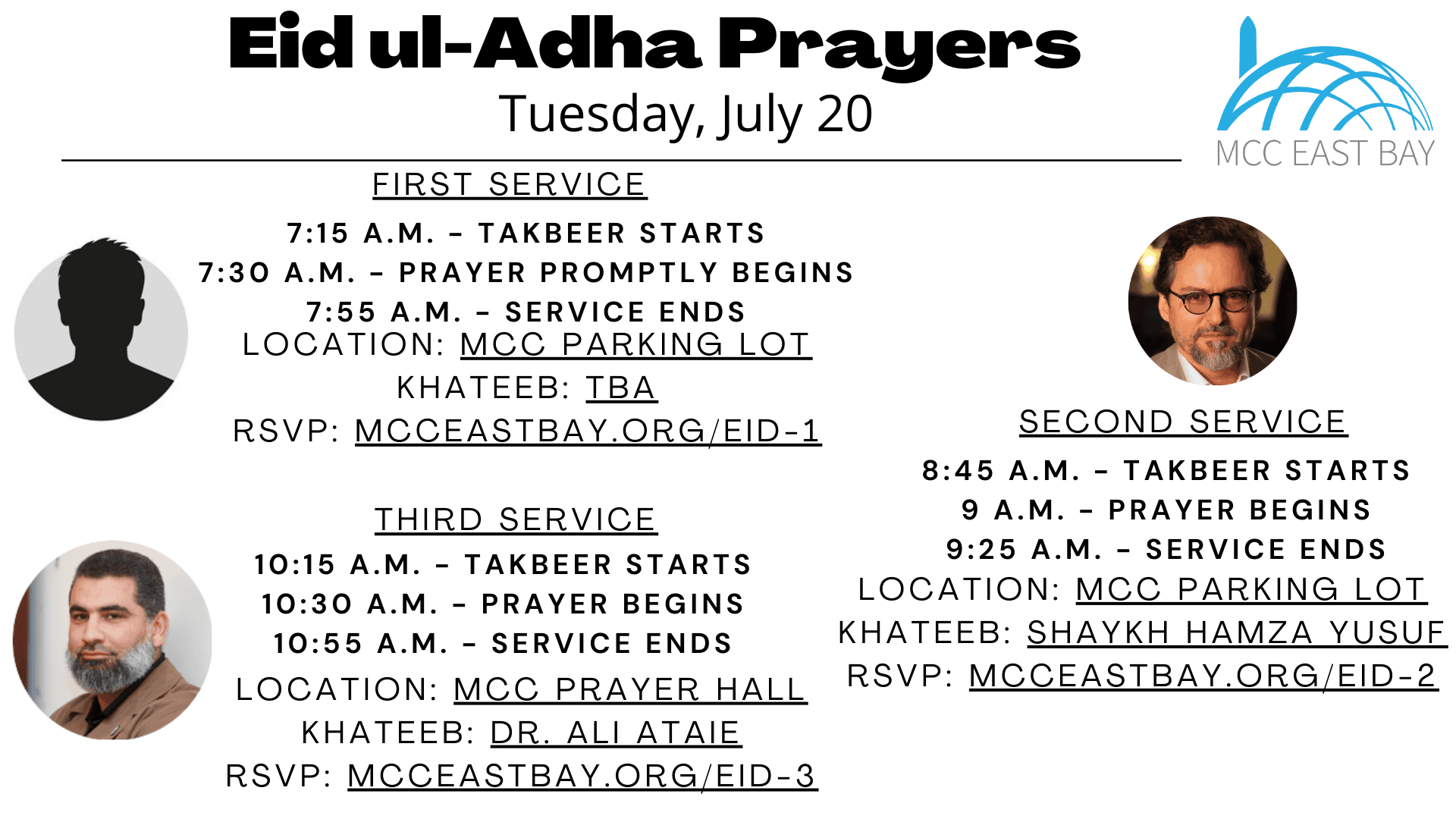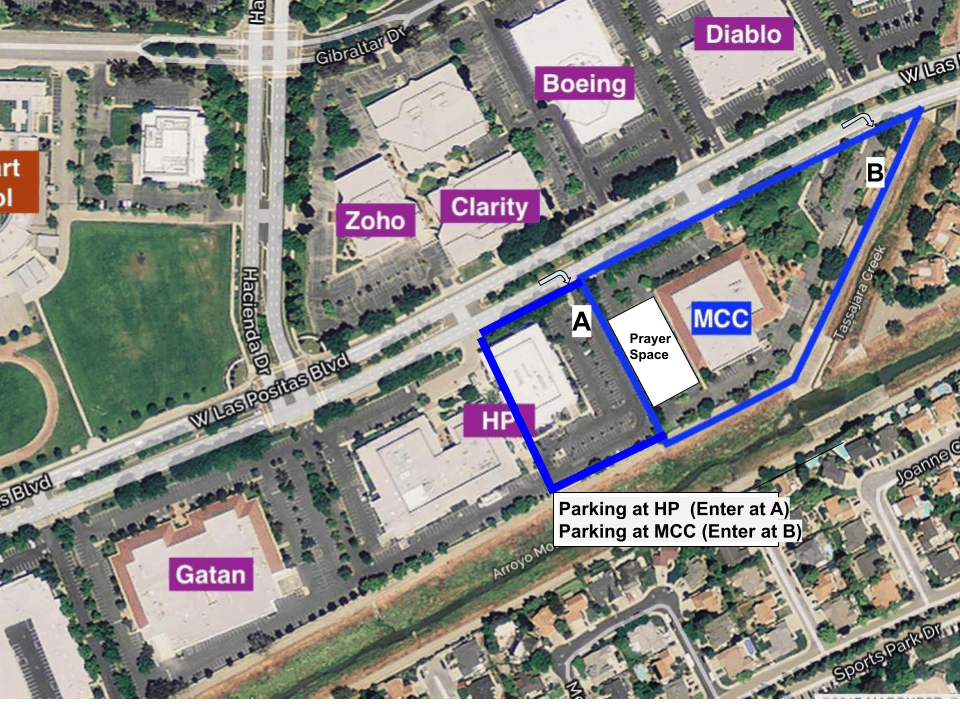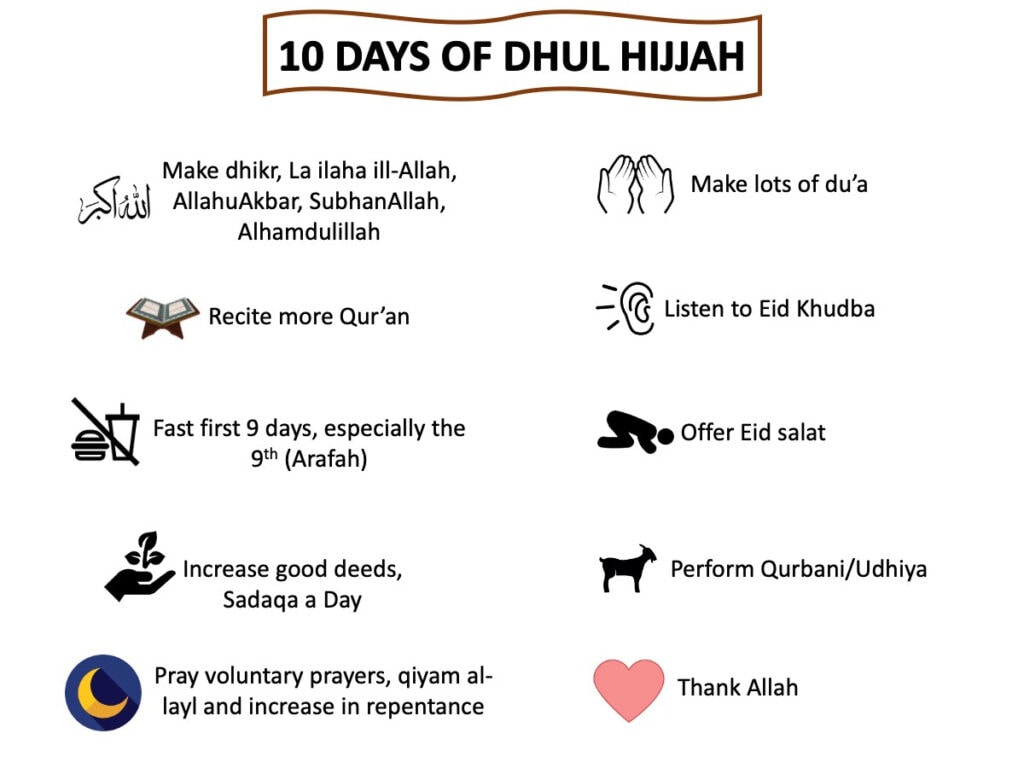What is Dhul Hijjah?
Dhul Hijjah is the name of the last month in the Islamic lunar calendar. It literally means: “the time of Hajj”.
Hajj is the fifth pillar of Islam and constitutes the pilgrimage to Makkah, which every Muslim must perform at least once in their lifetime if they are able to undertake it. That is what makes this month so special: it is the month in which the Pilgrimage takes place.
The First Ten Days
The first ten days are considered to be special in Islam. Allah created time and made some times to be better than others, where rewards are multiplied. This encourages people to do more good deeds and renew their zeal to worship Allah. It is similar to a farmer who works extra hard to plant crops during certain seasons because those times of the year will yield better results. The Prophet said regarding Dhul Ḥijjah, “There are no other days in which actions are better than in these ten days.”[1]
Therefore, it is recommended to increase in good deeds. Fast on as many of these days as possible, like the Prophet Muhammad did.[2] Pray in the masjid more often. Read more Qur’an, and reflect on it. Give more charity. Visit people who are sick. Be extra careful not to gossip, use profanity, or insult others.
Technically, the tenth day is the day of Eid, which is a celebration. It is not allowed to fast on this day. So when ‘ten days’ are mentioned, it actually means the first nine days of the month.
Cutting Hair and Nails
Some scholars hold that a person should not cut their nails or hair during these first ten days of Dhul Ḥijjah. That is because of the report that the Prophet Muhammad said: “Whoever sights the crescent for the month of Dhul Ḥijjah and intends to sacrifice an animal should cut neither his hair nor his nails.”[3] Imam Nawawī says that the wisdom behind this could be that a person who is offering a sacrifice wants to resemble a person performing Hajj since it is about sacrifice, so they refrain from cutting the hair and nails to further the resemblance [since pilgrims to Makkah are also not allowed to cut].[4]
However, there is another report about the Prophet by his wife ʿĀ’ishah that: “…the Prophet sent a sacrificial animal to the Kaʿbah [while residing at Madīnah] but did not abstain from anything [that a person performing Ḥajj would abstain from]…”[5] This report led many scholars to say that it is perfectly fine to cut one’s hair and nails during these days. This is the opinion that I lean towards. See the Appendix below for a more detailed discussion of why scholars have differed on this issue.
Fast on the 9th Day
The 9th day of this month (Saturday, Aug. 10) is called “the day of ʿArafah” because that is the day the pilgrims performing Hajj gather in the plain of ʿArafah, just outside Makkah. It is highly recommended for people who are not performing Hajj to fast on this day. This is a special fast that the Prophet Muhammad said: “Fasting on the day of ʿArafah is an expiation for the preceding year and the following year.”[6] This meant that the fast is so rewarded that it helps to absolve a person of some of the sins they committed in the past and might do in the future.
So, one day before the Eid celebration, make sure to fast (MCC hosts an Arafat program with Dr. Ataie and an outdoor Iftar on the eve of Eid).
Summarized Table of What to Do this Month
| Sunday, July 11-18
1st-8th of Dhul Ḥijjah |
Recommended to fast and do good deeds |
Monday, July 19
9th of Dhul Ḥijjah |
Highly recommended to fast |
Tuesday, July 20
10th of Dhul Ḥijjah |
Eid prayer and animal sacrifice |
Fajr of Monday, July 19 to Asr of Friday, July 23
Ayam ul Tashreeq |
These are the Days of Remembrance in the three days following ‘Eid ul-Adha. The Prophet (peace and blessings be upon him) called these the days of food and drink. Recite Takbeerat after each prayer during these days. |
Appendix
Muslims scholars have differed over whether or not there are any restrictions on cutting the nails or hair during the first ten days of Dhul Ḥijjah. This results from different approaches to dealing with the prophetic reports on the issue. There are two main pieces of evidence which result in three different opinions about how to understand them.
A: The prophetic report narrated by Umm Salamah states: “Whoever sights the crescent for the month of Dhul Ḥijjah and intends to sacrifice an animal should cut neither his hair nor his nails.”[7]
B: The prophetic report narrated by ʿĀ’ishah that: “…the Prophet sent a sacrificial animal to the Kaʿbah [while residing at Madīnah] but did not abstain from anything [that a person performing Ḥajj would abstain from]…”[8]
The first opinion is to affirm that both reports are equally authentic. Report A should be taken in its literal sense, but report B should be confined to only those who send a sacrificial animal, not those who sacrifice an animal within their own city.[9] The scholars who took this approach and said cutting nails and hair is forbidden for a person who intends to slaughter are Aḥmad ibn Ḥambal, Ibn Ḥazm, and Ṭaḥāwī [of the Ḥanafī school].[10]
The second opinion is to affirm both reports as equally authentic and that they are addressing the exact same issue, but understand that report A should not be taken literally as a prohibition, but rather as something disliked. The scholars who took this approach are ash-Shāfiʿī and some of Aḥmad ibn Ḥanbal’s students [such as Abū Yaʿlā].[11]
The third opinion is to prefer report B over report A because it is of a higher standard of authenticity. Report A is also dismissed since it is contrary to analogy [qiyās] because if a person was supposed to refrain from cutting their nails and hair, they should have also been instructed to refrain from certain clothing, perfume, and intimacy because that is what people who are performing Hajj must also do.[12] The scholars who took this approach and said there is nothing wrong with cutting the hair or nails are Abū Ḥanīfah and his students, Mālik and his students, and Sufyān al-Thawrī.[13]
[1] Al-Bukhārī
[2] “Allah’s Messenger used to fast the [first] nine days of Dhul Ḥijjah…” Abū Dāwūd
[3] Muslim 3:1565, Abū Dā’ūd 3:94, Tirmidhī 4:102, Nasā’ī 7:211.
[4] Sharḥ al-Nawawī ʿalā Muslim 13:138-139. Al-Nawawī mentioned another possible reason as well which I prefer not to mention here.
[5] Bukhārī 7:102, Muslim 2:957.
[6] Muslim
[7] Muslim 3:1565, Abū Dā’ūd 3:94, Tirmidhī 4:102, Nasā’ī 7:211.
[8] Bukhārī 7:102, Muslim 2:957.
[9] `Awn al-Maʿbūd wa Ḥāshiyah ibn al-Qayyim ʿalā Sunan Abī Dāwūd 7:346, al-Istidhkār 4:84.
[10] al-Tirmidhī 4:102, Tuḥfah al-Aḥwadhī 5:99-100, Sharḥ Mushkil al-Āthār 14:141-143.
[11] Tuḥfah al-Aḥwadhī 5:99-100, `Awn al-Maʿbūd wa Ḥāshiyah ibn al-Qayyim ʿalā Sunan Abī Dāwūd 7:346.
[12] `Awn al-Maʿbūd wa Ḥāshiyah ibn al-Qayyim ʿalā Sunan Abī Dāwūd 7:347.
[13] Tuḥfah al-Aḥwadhī 5:99-100, al-Istidhkār 4:84. |





